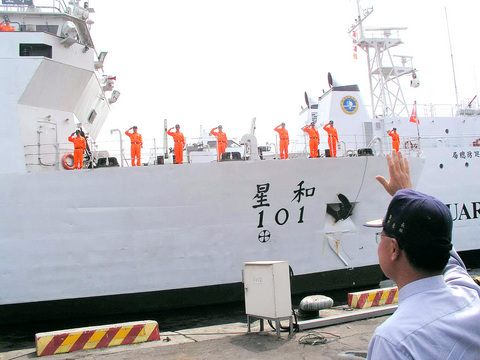Premier Frank Hsieh (謝長廷) yesterday said that the Coast Guard Administration has sent two vessels to patrol the nation's exclusive economic zone in the East China Sea.
"The ships are in the East China Sea to patrol and guard our fishing boats, not to emphasize our sovereign rights," Hsieh said at the legislature yesterday.
One legislator asked Hsieh if he would personally travel to the contested Tiaoyutai islets to reinforce the nation's claim to them.

PHOTO: HUANG MING-SHANG, TAIPEI TIMES
"Taiwan should assert that the Tiaoyutai islet cluster is its territory. But to avoid international controversy, I wouldn't go to Tiaoyutai myself to stress our sovereignty over the island," he said.
Two coast guard ships, the 1,800-tonne Ho Hsing and the 800-tonne Mou Hsing, departed Keelung for the island chains on Thursday.
The coast guard yesterday said the mission was a routine patrol.
Coast Guard Administration Deputy Director Yu Chien-tzu (
He said that from February 2003 to last month, coast guard ships have patrolled the East China Sea 102 times, the South China Sea 131 times, and the waters east of Taiwan 35 times.
To prevent Taiwan's fishing fleets from being harassed by foreign naval and other vessels, the coast guard earlier this week proposed that bases be established in the Dongsha Islands, the Pratas Islands and Pengchiayu islet. The proposal requires Cabinet approval.
Meanwhile, the Japanese newspaper Yomiuri Shimbun yesterday said the Japanese government would consider Beijing's suggestion that the two countries jointly search for oil resources in the contested oilfields of the East China Sea.
Some of the oilfields lie within Taiwan's exclusive economic zone.
A Chinese-language newspaper yesterday said the coast guard vessels were gathering information about Chinese and Japanese activity in the contested area.
The paper also said Beijing had recently permitted a "foreign company" to explore for oil in an area close to the Tiaoyutai islets, and that the ships would also observe its activities.

INVESTIGATION: The case is the latest instance of a DPP figure being implicated in an espionage network accused of allegedly leaking information to Chinese intelligence Democratic Progressive Party (DPP) member Ho Jen-chieh (何仁傑) was detained and held incommunicado yesterday on suspicion of spying for China during his tenure as assistant to then-minister of foreign affairs Joseph Wu (吳釗燮). The Taipei District Prosecutors’ Office said Ho was implicated during its investigation into alleged spying activities by former Presidential Office consultant Wu Shang-yu (吳尚雨). Prosecutors said there is reason to believe Ho breached the National Security Act (國家安全法) by leaking classified Ministry of Foreign Affairs information to Chinese intelligence. Following interrogation, prosecutors petitioned the Taipei District Court to detain Ho, citing concerns over potential collusion or tampering of evidence. The

‘FORM OF PROTEST’: The German Institute Taipei said it was ‘shocked’ to see Nazi symbolism used in connection with political aims as it condemned the incident Sung Chien-liang (宋建樑), who led efforts to recall Democratic Progressive Party (DPP) Legislator Lee Kun-cheng (李坤城), was released on bail of NT$80,000 yesterday amid an outcry over a Nazi armband he wore to questioning the night before. Sung arrived at the New Taipei City District Prosecutors’ Office for questioning in a recall petition forgery case on Tuesday night wearing a red armband bearing a swastika, carrying a copy of Adolf Hitler’s Mein Kampf and giving a Nazi salute. Sung left the building at 1:15am without the armband and apparently covering the book with a coat. This is a serious international scandal and Chinese

Seventy percent of middle and elementary schools now conduct English classes entirely in English, the Ministry of Education said, as it encourages schools nationwide to adopt this practice Minister of Education (MOE) Cheng Ying-yao (鄭英耀) is scheduled to present a report on the government’s bilingual education policy to the Legislative Yuan’s Education and Culture Committee today. The report would outline strategies aimed at expanding access to education, reducing regional disparities and improving talent cultivation. Implementation of bilingual education policies has varied across local governments, occasionally drawing public criticism. For example, some schools have required teachers of non-English subjects to pass English proficiency

TRADE: The premier pledged safeguards on ‘Made in Taiwan’ labeling, anti-dumping measures and stricter export controls to strengthen its position in trade talks Products labeled “made in Taiwan” must be genuinely made in Taiwan, Premier Cho Jung-tai (卓榮泰) said yesterday, vowing to enforce strict safeguards against “origin laundering” and initiate anti-dumping investigations to prevent China dumping its products in Taiwan. Cho made the remarks in a discussion session with representatives from industries in Kaohsiung. In response to the US government’s recent announcement of “reciprocal” tariffs on its trading partners, President William Lai (賴清德) and Cho last week began a series of consultations with industry leaders nationwide to gather feedback and address concerns. Taiwanese and US officials held a videoconference on Friday evening to discuss the